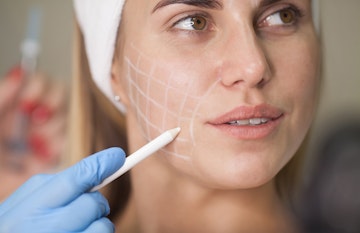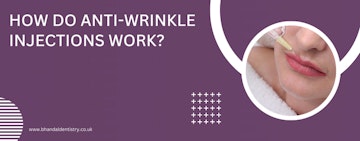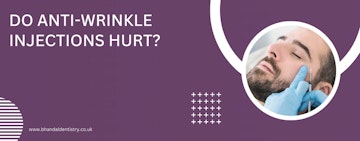Anti-wrinkle injections — All you need FAQ’s

The most common cosmetic treatment in the world now is anti-wrinkle injections. It's a simple and effective technique that involves a few injections, minimal downtime, and removing signs of ageing. Regardless, achieving natural and consistent results necessitates practice and knowledge of the underlying facial structure.
What are Anti-wrinkle injections?
Anti-wrinkle injections are a naturally existing protein that relaxes the facial muscles, reducing wrinkles. Anti-wrinkle injections are perhaps the most common wrinkle elimination therapy in the UK, and they are also relatively rapid to finish. It approximately takes 30 minutes to complete the procedure; so, it can be done before or after work. Since there are few adverse effects associated with this therapy, patients can quickly return to normal activities. The sensitivity in the face generally lasts an hour.

What areas can be treated with Anti Wrinkle?
Anti-wrinkle injections are widely used on the frown, forehead, and around the eyes. The therapy isn't only about freezing face muscles and expressions but can also help improve facial aesthetics, which also works by altering the dynamics and interaction between facial muscles. It is possible to change the height and form of the brows by adjusting the muscles that push and pull them.
In addition to that, anti-wrinkle injections can also be used to:
- change the form and height of your brows
- Reduce gummy grins by preventing the corners of the mouth from dragging down.
- the upper lip is everted
- vertical neckbands can be reduced
- decrease the chewing muscles' bulk
- diminish the appearance of bunny lines on the nose
- It also reduces dimpling of the chin
Anti-wrinkle injections may be used to address sweating in the armpits, hands, feet, and face.

How Do Anti-wrinkle injections Work?
Anti-wrinkle injections are mainly used to reduce the muscles that are caused by facial muscles. The injections contain a bacterial toxin that works by blocking the nerves transmitted to the muscles. This bacterial toxin comes from Clostridium botulinum and can also cause food poisoning. Ingesting this kind of toxin can cause paralysis.
Injections anti-wrinkle are a form of clostridium botulinum toxin. Once injected, this will target some facial muscles and cause them to relax. Therefore, this causes fine lines, frown lines, as well as wrinkles on the face. When the muscles on the face contract, they cause creases and wrinkles. Therefore, continual use of these anti-wrinkle treatments will help eliminate the lines and wrinkles on your face giving it a natural-looking appearance.
How Long Do Anti-wrinkle injections Last?
Anti-wrinkle injections only have a temporary effect. The length of efficacy is determined by the dosage given and the muscle mass injected. Anti-wrinkle injections can last for as long as 3-4 months on average.
Patients may notice that their anti-wrinkle injections last a lesser period or possibly stop working after repeated treatments in a small proportion of cases. In such situations, the immune system may have generated neutralizing antibodies. As a result, anti-wrinkle injections may serve as vaccination in and of itself. We use a refined form of anti-wrinkle injections to avoid this.
Impurities, such as proteins and inactive toxins, are frequently blamed for the immune reaction that fights anti-wrinkle injections' effectiveness. These contaminants are removed from the pure anti-wrinkle injection, which does not trigger an immunological response.
Who is suitable for anti-wrinkle injections?
Patients who want to minimize the appearance of frown lines, or forehead lines, wrinkles around their eyes might benefit from anti-wrinkle injections. We are frequently asked where anti-wrinkle injections should be used to decrease the symptoms of ageing. While this varies by patient, the most common locations are:
- The brow/forehead
- In between the brows
- Eyes on the sides
Who Should Not Use Anti-wrinkle injections?
YOu should schedule an appointment with any member of a local clinic team if you want to have anti-wrinkle injections. However, these treatments should not just be used anyhow; you are advised not to use anti-wrinkle injections if:
- The ingredients used in anti-wrinkle injections cause allergic reactions
- You are pregnant or breastfeeding
- you have an infection on the injection site
- If you have a neuromuscular disorder such as myasthenia gravis
If you are unsure whether these treatments are for you, you can start by listing all the side effects and the contraindications that you can discuss with your doctor during a face-to-face meeting.
Anti Wrinkle Injection Prices
The anti-wrinkle injection prices vary depending on many factors, such as the amount of injection given. The number of units that are offered depends on your muscles and how active they are.
Typically, a single unit costs around 9-25 pounds. Treating an area like a forehead will require approximately 12-30 units; this costs about 90 to 300 pounds. The charges are also different based on the practitioner. Treating crow's feet will cost roughly the same price as treating the forehead. An alternative that one may also choose is dermal fillers. A dermal filler is called an injectable implant or a wrinkle filler that creates smoothness on your face.
What will the treatment involve?
Wrinkles are naturally occurring; most people will see anti-wrinkle injections in their first cosmetic journey. The following are the procedures involved in the treatment:
The procedure appears to be non-invasive and straightforward. However, achieving reliable and natural outcomes necessitates a scientific and regulated method. Your clinic creates treatment procedures and processes to improve patient experiences and cosmetic results.
Before each treatment, the clinic needs to have photos of the face and videos of your facial expressions. This enables for a comparison of before and after therapy.
The first stage in therapy is to thoroughly wipe the face with antiseptic to eliminate makeup and skin infections. Vein finders are then used to find where the veins in the areas to be treated are found. This is a crucial step as it helps in ensuring that there is minimal bruising after the treatment.
Then, the movement of the muscles in the treatment areas is analyzed and evaluated; next, the points of injection are marked. Again, this is an essential step as it ensures that the injections are placed accurately. Photos of the markings can also be taken for future reference.
Fine needles and syringes are used in administering anti-wrinkle injections. The injection gun is injected in the premarked regions of the face.
This approach uses depth and dose to be very precise. In addition, discomfort is minimized considerably since the needle moves across the skin substantially faster and faster than done by hand. Before injection, ice cubes or vibrators may also be used in the treatment region. This also decreases pain considerably. The used skin is re-cleaned with antiseptic and blood or marks removed after treatment.
Are Anti-wrinkle injections Safe?
Anti-wrinkle injections have been used for aesthetic and medicinal purposes for over a decade, with no reports of long-term adverse effects. Additionally, they are utilized for the long-term therapy of various medical problems, typically in considerably larger dosages. Spasticity, headaches, dystonia, and extreme fatigue are all examples of this.
Anti-wrinkle injections have been used for four decades, but the therapy has evolved with time. Anti-wrinkle injections are still used by doctors today to release tension and relax sweat glands in addition to cosmetic clients. When administered by a skilled medical professional, anti-wrinkle injections are entirely safe. To accomplish this non-surgical treatment, medical professionals need the proper expertise; the risks are pretty small.

Do Anti-wrinkle Injections hurt?
Because this is a non-surgical therapy, the procedure is entirely painless. If you are sensitive to injections, you may suffer some slight pain due to the little needle injection required.
In most cases, there are very few adverse effects and little downtime associated with therapy. A bruise may form over the treated region on rare occasions, especially around the eyes. If necessary, this can be concealed with makeup. The injected area generally has some transitory redness and swelling that lasts for less than an hour.
If you're concerned about the potential adverse effects of Anti-wrinkle injections, make an appointment with a skilled medical Anti-wrinkle injections facility. Anti-wrinkle injections are linked with a range of short-term and minor adverse effects, the most frequent of which is slight bruising at the injection site. Mild headaches are also reported by some individuals immediately after therapy, although these generally go away within 24 hours.
When anti-wrinkle injections are used to treat the frown, about 1% of patients suffer product migration into one eyelid, resulting in a partial eyelid droop that can persist for up to a month. Any treatment-related adverse effects are very transitory and will go away on their own. If necessary, a specific eyedrop can be administered to decrease the impact of this effect temporarily.

What happens after Anti-wrinkle injections?
Any anti-wrinkle injectable clinic would tell you that you may go about your business as usual. A medical doctor's only cautionary advice is to limit vigorous activity, massages, and other face procedures for up to 24 hours. Anti-wrinkle injections have benefits that are visible pretty quickly. You will notice a difference in wrinkles and fine lines after 4-10 days of using them.
Is anti-wrinkle injection the same as Botox?
Anti-wrinkle injections are identical to Botox injections.
Botox is a trademarked term. Botox is a word used to describe an injectable method that has multiple competing products on the market, similar to Kleenex. Botox is very commonly used.
These types of injections relax your facial muscles. They also help in reducing wrinkles and preventing the formation of creases. They last for 4 to 6 months if injected correctly; this also depends on your lifestyle and metabolism. Anti-wrinkle injections can be used to treat crows feet, wrinkles, forehead lines, frown lines, dimpled chins, Jawline Contouring, Nefertiti Neck Lifts, Bruxism and Gummy Smile Correction.
Anti-wrinkle injections when pregnant
Anti-wrinkle injections such as Botox are classed as Category C; this indicates that Botox has shown a detrimental effect on the fetus in reproductive animal research, but no official risk studies have been carried out on pregnant people. (The question of whether Botox may enter breastmilk is also questionable). Botox producers are unlikely to conduct proper research to examine the particular effects of anti-wrinkle injections on a growing fetus.
These inject are used to keep your muscles relaxed and eliminate the wrinkles on your face. The effects are noticed for 4 to 6 months. They can be used for many things, including minimizing frown lines, fine lines, neck lifts, and smile correction.

Is it possible to become resistant to anti-wrinkle treatments?
Anti-wrinkle therapy has to be done at regular intervals; the majority of patients get standard long-term therapy. Anti-wrinkle injections, however, can be immune. Therapy may be an individual vaccination.
Anti-wrinkle injections are active ingredients of a bacteria toxin and do not produce an immune reaction curiously. However, the immune system is stimulated by the related components made with the bacterial toxin. This results in the formation of neutralizing antibodies, which render subsequent treatments partially or entirely useless. Surprisingly, the associated components have little influence on clinical outcomes.
The higher the dose and the more often the therapy is given, the more probable that immunity will develop. The issue gets even worse when anti-wrinkle injections are used in considerably greater dosages for medicinal reasons such as spasticity or dystonia. Even with the generally smaller dosages used in aesthetics, we encounter incidents of resistance – especially when the therapy must be repeated over time.
One anti-wrinkle brand has been refined to ensure that just the active ingredient is present. This medication has the lowest chance of inducing an immunological response and, as a result, therapeutic non-responsiveness.
Call us now to make an appointment

Keep reading...
How A Smile Makeover Can Increase Your Confidence
When patients want to achieve a dramatic transformation, we often recommend a smile makeover. This bespoke treatment plan can mean…
What is SmileFast?
SmileFast is a new dental treatment plan that allows you to achieve a dramatic smile transformation in as little time…
What are Veneers?
Veneers are thin coats fitting over the teeth, protecting them from damage and creating a lovely smile. The tooth-coloured shells…
Lip Fillers Advice for First-Timers: Aftercare and Maintenance
Getting lip fillers in coventry for the first time can be very exciting but also very daunting. Any procedure that…

Hear from our
happy patients
These are just some of the kind words about our practice, direct from our incredible patients.









